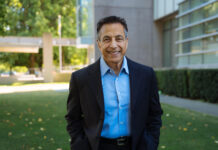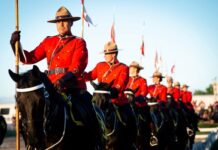
Photo by Chandra Bodalia
BY RATTAN MALL
IN the wake of the appalling attack on Wednesday in which Michael Zehaf-Bibeau shot Cpl. Nathan Cirillo at Ottawa’s National War Memorial before storming into Parliament Hill’s Centre Block where he fired numerous shots before being killed by the security staff, former B.C. solicitor general Kash Heed is calling for security guards at the B.C. Legislature to be armed and substantially trained.
Heed told The VOICE on Thursday: “I am very concerned about security not only in the B.C. Legislature but the security around our infrastructure and public places here in British Columbia when in fact you have our House of Commons attacked – and you can see how vulnerable the House of Commons was – and the killing of a soldier who was guarding a cenotaph [Ottawa’s National War Memorial]. It’s very, very concerning.”
Heed, who has been a police chief, added: “From my knowledge of the security at the Legislature, I think the people within that precinct are at risk because if we have someone that’s determined to create havoc in the B.C. Legislature, it’s quite easy for that person to do it because we have not kept up with the security demands that’s required in this global world of terrorism now.”
WHEN asked what security measures were required, Heed told me that the first thing was to secure public entrances and make sure that everyone – “no matter who you are” – has to go through the metal detector and have their bags searched. Simultaneously, you have to make sure that the guards are armed. Heed that the guards at the Legislature are highly qualified personnel who include former police officers and military personnel.
He added: “It’s not going to be a deterrent for anyone who wants to cause havoc when you’ve got guards standing there that are unarmed. These people should be armed and at the same time they should be given a substantial amount of training in order to deter these activities from taking place such as what we call an active shooter scenario type training which we implemented shortly after several incidents in the United States occurred.
“Police departments all across Canada implemented this active shooter training where in fact you take the resources you have and you immediately go into the threat.
“And that appears to be what happened at the House of Commons where in fact once the threat [Michael Zehaf-Bibeau] got inside – mind you, that threat should never have got inside, but once it got inside, they effectively dealt with it.”
Heed said Canadians have to get used to such security measures. He added: “If you look at what we’ve done with our airport security, you can see that it’s a little bit of an inconvenience for people, but it ensures the security of those individuals that are travelling. We want to ensure the security of the people within the Legislature and the lawmakers that are working inside that along with the staff.”
WHEN I pointed out to Heed that this would require substantial changes in attitude and procedures. He replied: “Well, attitude – definitely!”
He said: “The complacent attitude is probably going to harm us more than anything else. You’ve got complacent attitudes within some of the bureaucracy and with some of the politicians.
“Canada has changed and people have to realize that. We are getting involved more and more in foreign affairs, we’re getting involved in wars. When you do that, you are going to be a target and that’s why you have to ensure that you take care of your domestic security such as the United States.
“For example, if you’re in the United States, you go anywhere near some of their public institutions, they have those security precautions in place. That’s simply because the U.S. is so involved around the world that they are a target for these extreme terrorists and we are starting to act a lot more in our policies a lot more like the United States.
“And we have to ensure that we take care of domestic security and I think we have fallen behind in that.”
HEED pointed out that RCMP Commissioner Bob Paulson and Canadian Security Intelligence Service (CSIS) Director Michel Coulombe told a House of Commons committee that they were watching 90 suspects.
He added: “I am sure it’s a lot more than 90 and I am not sure where they are getting this number from. And we have to be aware of that because you not only have the outreach of the terrorist groups around the world into our country, but you also have local people that are anti-authority, you have some copycat people, you have several others that are involved in this. They are trying to sympathize with what’s going on around the world and I have to question why we always suddenly find out about these things after the fact.
“The individual [Martin Couture-Rouleau] that was involved in the Quebec incident that hit the two soldiers and killed one of them … well, we find out after the fact – ‘yes, we took his passport away, we were concerned about him about going overseas.’ I am starting to hear the same thing about the individual [Michael Zehaf-Bibeau] involved in the incident [Wednesday].
“So it’s great to have this intelligence – I can understand you just can’t arbitrarily go and arrest these people – but are we being as effective as we can based on what we know about these individuals? Those are questions that really need to be asked.”













